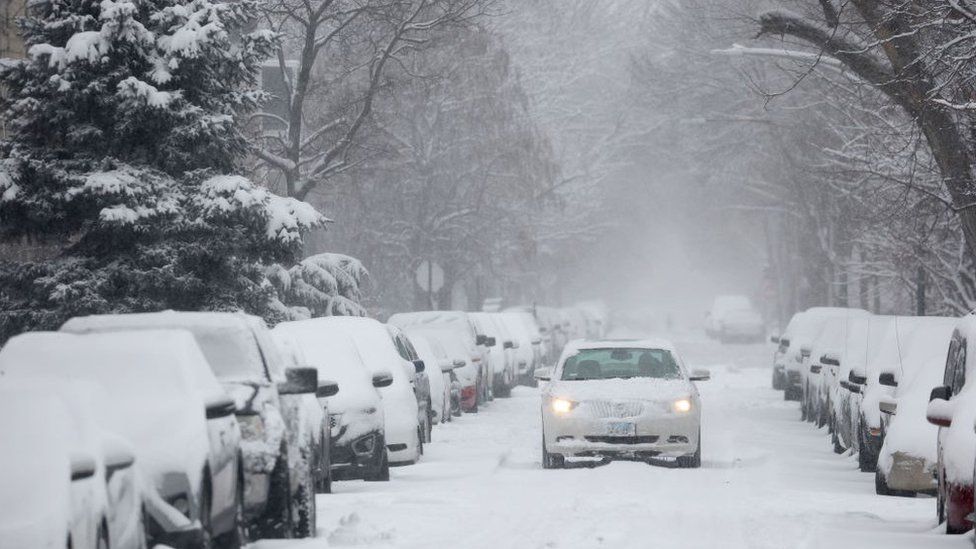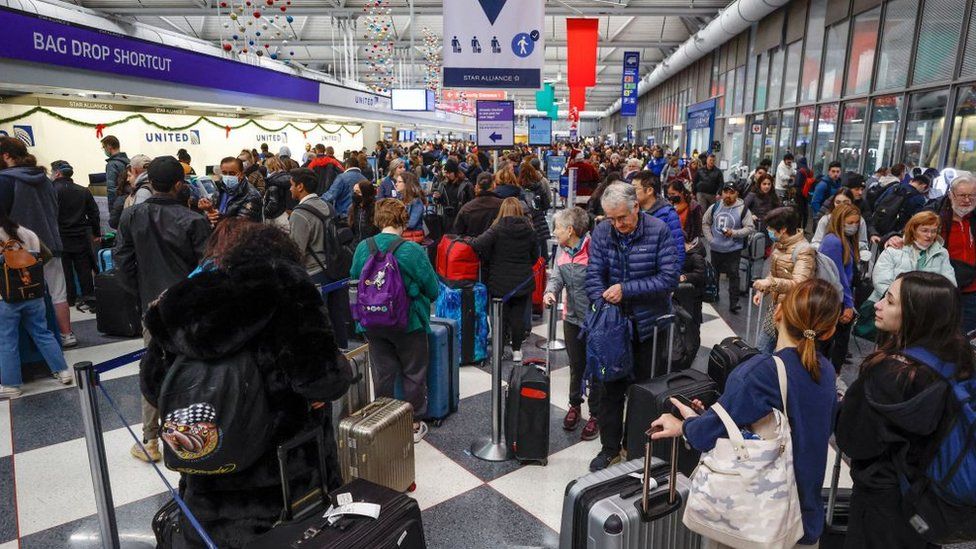This video can not be played
To play this video you need to enable JavaScript in your browser.
A powerful Arctic winter storm is making its way through the US and parts of Canada, bringing with it frigid temperatures and flight delays ahead of the busiest travel days of the year.
More than 100 million people across the US are under winter weather alerts, and snowy conditions are expected to wreak travel chaos this weekend.
Major airports have already cancelled flights in anticipation of the storm.
The cold snap could bring the coldest Christmas in decades, say forecasters.
The National Weather Service (NWS) said bone-chilling temperatures of -50F (-45C) and -70F were possible by the end of this week in some parts of the country.
Meteorologists say the winter storm could become a "bomb cyclone" - an unofficial term for a certain type of powerful, rapidly strengthening storm - by Friday.
The Arctic air mass is projected to travel as low as the US-Mexico border, where strong wind gusts will dip the temperature to 15F (-9.4C) in El Paso, Texas.
Even Florida, the Sunshine State, is projected to see its coldest Christmas in 30 years.
The NWS has called it a "once-in-a-generation" winter weather event, especially as the storm reaches the Great Lakes region, where its pressure is expected to reach the equivalent of a Category 3 hurricane.
The storm is also bringing with it snowfall and powerful winds, which are expected to cause damage and power outages in the Midwest and Canada.

Where has the storm and severe cold hit?
Frigid temperatures are already being felt by millions as the storm and bitter cold moves eastward:
- Temperatures have plunged in several US states, including Texas, Kansas and Missouri.
- In Colorado, temperatures dipped to a record-breaking low of -9F from 42F on Thursday. Meanwhile, temperatures in Wyoming have dropped as low as -35F
- Later on Thursday, forecasters expect heavy snowfall will begin to hit Chicago, whipped around by gusts topping 50mph (80km/h).
- In Canada, much of Ontario and parts of Quebec are also bracing for a major winter storm on Thursday that is expected to last through the Christmas weekend, bringing with it "strong and potentially damaging winds," Canada's National Weather Service said.
Winter storm has disrupted travel
The storm has come during the busiest travel days of the year. The Transportation Security Administration said it expects holiday travel volume to be close to pre-pandemic levels, with the busiest day on Thursday.
More than 2,200 flights in the US have already been cancelled on Thursday and Friday, according to the flight tracking site FlightAware.
This includes cancellations out of Chicago's airport - one of the busiest in the country.
In anticipation of travel disruptions, major airlines including United, Delta and American have offered to waive fees for travellers who wish to reschedule their flights.
Snowy conditions and freezing roadways are also expected to wreak havoc on road travel this weekend.
Roads along the Colorado-Wyoming border were closed on Wednesday due to nearly zero visibility.
In South Dakota, more than 100 cars were stranded on snow-covered roads on Wednesday, prompting emergency rescue operations. The airport in the state's capital city has also closed.
The American Automobile Association estimated that more than 112 million people will travel 50 miles (80 km) or more from home between Friday and January 2, the vast majority -102 million - by car.
"We had a great Thanksgiving week with minimal disruption," US Transportation Secretary Pete Buttigieg told cable channel MSNBC on Wednesday.
"Unfortunately, it's not going to be that way going into Christmas."

States of emergency declared
The governors of Kentucky, North Carolina, Georgia and Oklahoma have declared states of emergency.
Other states, like Maryland, have activated emergency response operations ahead of the storm, while others have opened warming shelters.
In Colorado, the Denver Coliseum, an indoor arena, has been converted into a warming centre.
On Thursday, US President Joe Biden said his administration has contacted the governors of 26 affected states and that the federal government is prepared to offer help where needed.
He also encouraged people to avoid travelling as the conditions worsen. "Please take this storm extremely seriously," Mr Biden said.
What is a bomb cyclone?
The term "bomb cyclone" has been used to describe this storm as it develops over the Great Lakes region. But what exactly is that?
Bomb cyclone is a term given to a storm that intensifies rapidly, with its central air pressure dropping by at least 24 millibars in 24 hours.
They are referred to as bomb cyclones due to the explosive power caused by the rapid fall in pressure.
Such storms bring weather ranging from blizzards to severe thunderstorms to heavy precipitation.
Bomb cyclones are most common on the east coast of the US and Canada, where the cool land and warm Gulf Stream current provide optimal conditions.
This video can not be played
To play this video you need to enable JavaScript in your browser.
https://news.google.com/__i/rss/rd/articles/CBMiM2h0dHBzOi8vd3d3LmJiYy5jby51ay9uZXdzL3dvcmxkLXVzLWNhbmFkYS02NDA2MTU4ONIBN2h0dHBzOi8vd3d3LmJiYy5jby51ay9uZXdzL3dvcmxkLXVzLWNhbmFkYS02NDA2MTU4OC5hbXA?oc=5
2022-12-22 16:56:40Z
1701827913
Tidak ada komentar:
Posting Komentar